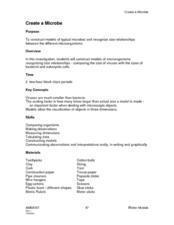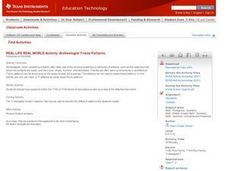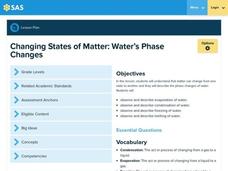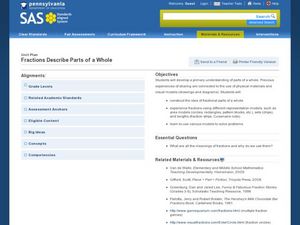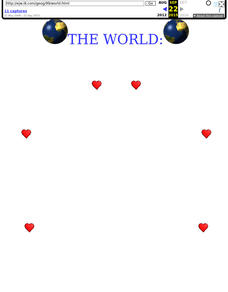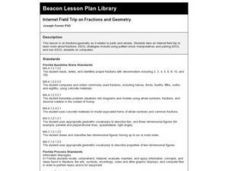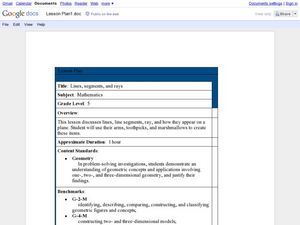Curated OER
Chemistry Module
Students build metal atomic models using styrofoam. In this chemistry lesson, students identify the different unique properties of metals. They explain how metal atoms bond.
Curated OER
Fractions of a Set
Third graders use fractions to describe part of a set. In this fractions lesson, 3rd graders are introduced to fractions through a book and use pattern blocks to describe a fraction as a part of a set. This lesson includes a scripted...
Curated OER
Polydron Fun
Students investigate nets as they relate to volume and area. For this geometry lesson, students use nets as a visual to deepen their understanding of surface area and volume of objects. They make conjectures about different objects and...
Curated OER
Biodiversity
Students investigate the diversity of temperate forests and tropical rainforests. They catch and observe local insects, sort leaves and insects on a chart, listen to the book "A Walk in the Rainforest," and create a class bar graph that...
Curated OER
Create a Microbe
Learners construct models of microorganisms recognizing size relationships-comparing the size of viruses with the sizes of bacterial and eukaryotic cells. They put into perspective just how small microbes are by comparing the size of...
Alabama Learning Exchange
The Grouchy Ladybug
Students listen to the book, "The Grouchy Ladybug" by Eric Carle and sequence the events in the story. Using a graph, they draw and color the animals that the ladybug meets next to the corresponding time from the story, and conduct...
Curated OER
Archeologist Frieze Patterns
Learners construct frieze patterns using translations and rotations. They will discuss how frieze patterns are similar to jigsaw puzzles and use Cabri Jr. to build a triangle frieze pattern using rotations, translations, and reflections.
Curated OER
Life Cycle: Diversity in a Balance 4th Grade Workbook
In this life cycle workbook, 5th graders examine plant and animal cells, classification of organisms, human biology, photosynthesis, and natural environments. 21 different activities make up the Life Cycle Workbook.
Curated OER
Analytic Geometry
In this analytic geometry worksheet, 9th graders graph and solve 13 different types of problems that include determining whether equations are linear to matching given equations to their corresponding equation in the second column....
Curated OER
Away We Go!
Learners study types of transportation. In this transportation lesson, students survey several classes to gather data on how they get to school. Learners create a transportation graph.
Curated OER
Transformations and Exponential Functions
Tenth graders study graphing exponential functions. In this transformations lesson plan, 10th graders apply inquiry to determine how changes to a parent function affect its graph. Students analyze transformed graphs and generate the...
Curated OER
Symmetry
Students explore symmetry. In this geometry lesson, student identify and define bilateral symmetry, radial symmetry, pentagonal symmetry, hexagonal symmetry, and cubic symmetry. Students construct examples of these types of symmetry and...
Pennsylvania Department of Education
Changing States of Matter: Water’s Phase Changes
Third graders observe the properties of water and in its different states. In this states of matter lesson plan, 3rd graders view a video, read The Magic School Bus at the Waterworks and experiment with freezing, melting and...
Curated OER
Fractions Describe Parts of a Whole
Third graders represent fractions as part of a whole. In this fractions lesson, 3rd graders use manipulatives to show how a fraction is a part of a whole. This lesson includes individual practice and an assessment instead of direct...
Curated OER
Super Sort
Students sort objects based on one characteristic. They define the term "attribute" and give examples of attributes of objects. Students explain their reasoning for sorting objects into groups.
Curated OER
Cloud Viewer
Fourth graders examine different types of clouds. In this cloud lesson, 4th graders examine pictures of different types of clouds and read details about them in the captions under the images. They make a cloud viewer by cutting out the...
Curated OER
The World (With an emphasis on the United States)
Fourth graders recognize the different continents. They are introduced to longitude and latitude and how to find locations using these measurements. This series ends with an emphasis on the fifty states of the United States and their...
Curated OER
Internet Field Trip on Fractions and Geometry
Young scholars take an Internet field trip to research fractions. ESOL strategies include using pattern block manipulatives and pairing ESOL and non-ESOL students on computers.
Curated OER
Beautiful Bovine
Students compare and contrast a human body to a cow. Using a diagram, they label and identify the functions of the cow's numerous parts. In groups, they create a Venn Diagram to compare the various types of cows with one another. They...
Curated OER
Attributes and Patterns with Buttons
Students work with attribute buttons in order to sort, create, and analyze patterns. Students practice identifying patterns and verbalizing the sorting rules and patterns they used. Sample assessments and rubric are provided.
Curated OER
Liquids Have Differnt Viscosities
Young scholars explore visosity of matter. They run tests of various liquid substances to observe and compare rates of flow of different substances. In addition, they relate viscosity to distance travelled by sample substances.
Curated OER
Lines, Segments, and Rays
Fifth graders use their arm, toothpicks, and marshmallows to create lines, segments, and rays. In this lines, segments, and rays lesson plan, 5th graders learn how these appear on a plane.
Curated OER
Prime Numbers and Factors
Students determine factors of numbers to 100 and identify prime factors; students differentiate prime and composite numbers by the factors of the numbers.
Curated OER
Making Changes
Students observe and record the changes they see when adding heat and cold to objects. For this changes lesson plan, students experiment with different objects and see if heat and cold change the makeup of the object. They then record...






